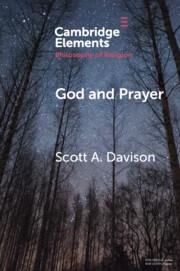Element contents
God and Prayer
Published online by Cambridge University Press: 08 March 2022
Summary
Keywords
- Type
- Element
- Information
- Online ISBN: 9781108974967Publisher: Cambridge University PressPrint publication: 07 April 2022
References
- 4
- Cited by



